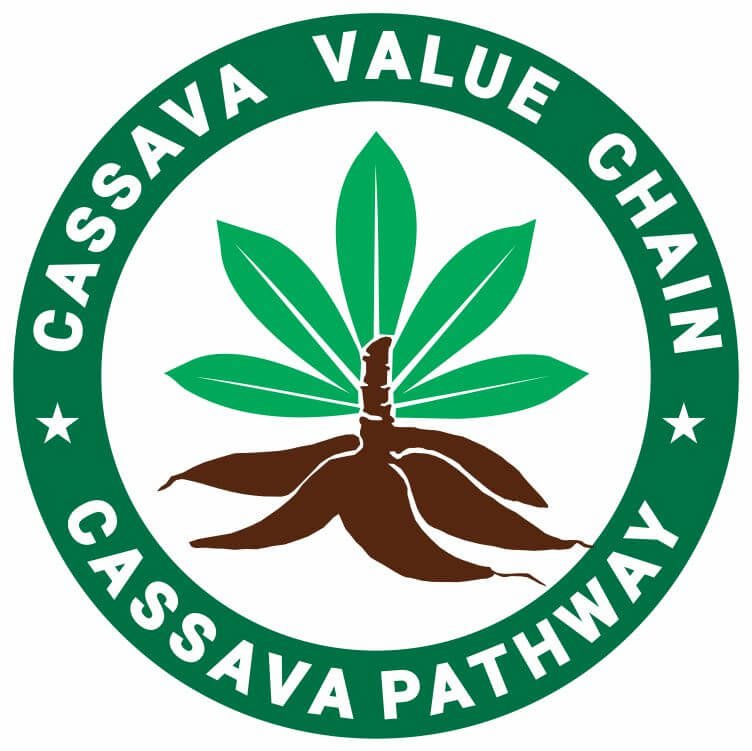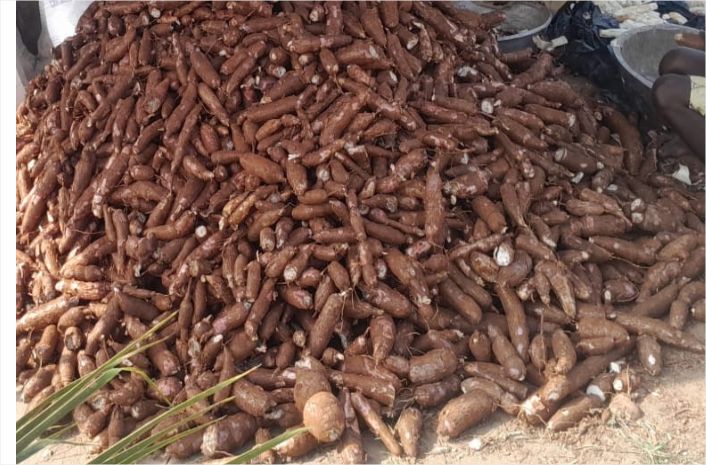Wondering where cassava comes from? You’re in the right place. Here are the top producers of cassava root in the world.
Nigeria is the world’s top producer of cassava root, providing around 20% of the world’s cassava.
But Nigeria isn’t alone, countries like Thailand, Indonesia, Brazil, and the Democratic Republic of the Congo also play a big part in growing this valuable crop.
Cassava isn’t just food; it is a giant industry that is spreading its tentacles in animal feed, industrial products like ethanol, and even biofuels.
Let’s take a closer look at the countries leading the way in cassava production and what challenges they’re tackling to keep the supply steady.
Recommended: Yes! Cassava Can Grow in United States, But…
Top Producers of Cassava Root in the World and their Runners-up
| Country | Production Volume (Million Metric Tons) |
|---|---|
| Nigeria | 60.8 |
| Thailand | 34.1 |
| Indonesia | 28.0 |
| Brazil | 17.7 |
| Democratic Republic of Congo | 48.8 |
These countries are the leading producers of cassava, with Nigeria being the largest contributor to global production.
Nigeria: The Leading Producer of Cassava
Nigeria is the world’s top producer of cassava by a great margin, contributing around 20% of global output, with over 59 million metric tons produced annually.
This agricultural success is deeply rooted in the country’s history and climate, with ideal growing conditions in regions like the Southwest, South-South, and Southeast.
Traditional farming methods and government support through research and development bolster production.
Cassava is vital for food security and the economy, providing income through products like flour, chips, and ethanol.
However, challenges such as pests, diseases, and price fluctuations threaten farmers’ livelihoods, and addressing these issues is key to sustainable growth.
Related: Cassava Tuber in the Global Market
Thailand: A Key Player in the Cassava Market
Thailand is one of the top producers of cassava root in the world, significantly impacting both local and global markets.
The country’s agricultural infrastructure and favorable climate, particularly in regions like Nakhon Ratchasima and Buriram in the northeast, support cassava cultivation.
These areas benefit from well-drained soils and advanced farming techniques. Thai farmers use innovative practices, including intercropping and cultivating high-yielding cassava varieties, ensuring a strong position in the global supply chain.
With investments in modern processing technologies, Thailand transforms cassava into products like tapioca starch and flour.
These innovations enhance marketability, boosting the economy while maintaining high-quality standards for global competitiveness.
Related: The Impact of Cassava Farming on the Environment
Indonesia: Growth and Opportunities in Cassava
As one of the top producers of cassava root in the world, Indonesia has been increasing its cassava production due to its favorable climate and supportive government initiatives.
The country’s diverse agricultural lands create ideal conditions for cultivation, and government policies have encouraged farmers to adopt modern farming techniques, leading to higher yields.
Cassava is widely used in various forms, such as flour, snacks, and traditional dishes, making it essential for food security.
The rise in demand for gluten-free products has opened new opportunities for farmers. Indonesia also exports cassava, with key markets in China, the EU, and ASEAN countries, thanks to efficient shipping infrastructure and competitive production costs.
Related: Best Practices in Cassava Farming
Brazil: Meeting Domestic and International Demand for Cassava
Brazil is a key player in the global cassava market, serving both domestic and international demand.
Cassava is vital for food, livestock feed, and industrial uses like starch and ethanol production.
As one of the top producers of cassava root in the world, the Brazilian government supports farmers through financial assistance, technical training, and research to improve cassava varieties, helping boost yields.
Cassava farming is crucial for rural communities, providing food security and income. Often intercropped with other crops, it promotes food sovereignty.
As a major exporter to Europe and Asia, Brazil’s investments in infrastructure and trade agreements facilitate smooth exports, making cassava a cornerstone of the country’s agricultural economy.
Related: Cassava Stems and Varieties
Democratic Republic of the Congo: A Staple Crop
Cassava is a vital crop in the Democratic Republic of the Congo (DRC), providing essential calories for millions, especially in rural areas.
While integral to the country’s agricultural practices, cassava farming faces challenges such as pests, diseases, and limited infrastructure.
The cassava mosaic virus and cassava brown streak disease have significantly reduced yields, jeopardizing farmers’ livelihoods. Poor transportation networks hinder market access, impacting distribution.
To address these issues, the DRC is investing in disease-resistant cassava varieties, improving farming techniques, and strengthening infrastructure.
With ongoing research and development, the country aims to enhance cassava production, supporting food security and the economy.
Recommended: Things to Consider When Starting a Cassava Farm
Other Notable Cassava Producers
While Nigeria, Brazil, Thailand, and Indonesia are the top cassava root producers in the world, several other countries also make important contributions to global cassava production.
Ghana in Cassava Production
Cassava is not only a staple food in Ghana but also a valuable cash crop. The country has integrated cassava into its agricultural practices, and the government’s investment in agricultural technology has helped improve production.
Cassava is processed into flour, starch, and other products, contributing to the country’s food security and economic growth.
Vietnam
Vietnam has used its vast landscape and favorable climate to become a major player in cassava production.
Cassava is increasingly used for industrial purposes like animal feed and biofuels, adding value to the agricultural sector.
With improved farming techniques, Vietnamese farmers have been able to boost cassava yields, catering to both local and global markets.
Cambodia
In northeastern Cambodia, cassava plays an important role in supporting rural communities by providing both food and income. The country has invested in improving cassava quality and expanding its export capacity, aiming to tap into global markets.
Mexico
Mexico has successfully integrated traditional farming practices with modern agricultural techniques in cassava cultivation.
This crop is grown both for human consumption and livestock feed. Ongoing research in breeding techniques promises to boost production further, improving both food systems and the economy.
Frequently Asked Questions
Why is Nigeria the top producer of cassava?
Nigeria’s ideal climate and farming methods make it the largest producer of cassava in the world.
How does Thailand contribute to the global cassava market?
Thailand’s innovative farming techniques and processing technologies help it supply high-quality cassava products globally.
What challenges does cassava farming face in the Democratic Republic of the Congo?
Pests, diseases, and poor infrastructure limit cassava production and make distribution difficult in the DRC.
How is cassava used in Brazil’s economy?
In Brazil, cassava is processed into food, animal feed, starch, and ethanol, contributing to both food security and industry.
Conclusion
Cassava isn’t just a crop; it’s a critical part of many economies and food systems around the world.
Nigeria might lead in production, but Thailand, Indonesia, and Brazil are making their mark too, driving both local and global markets.
As important as cassava is, it still faces hurdles like pests, diseases, and infrastructure gaps. However, with the right focus on research and improving farming techniques, this crop will continue to be a major player in agriculture.
The future of cassava farming depends on adapting to these challenges and ensuring farmers can meet growing demand.

Chimeremeze Emeh is a writer and researcher passionate about Africa’s most transformative root crop—cassava. Through his work at cassavavaluechain.com, he explores the entire cassava industry, from cultivation and processing to its diverse applications in food, health, and industrial use.
He also writes for palmoilpalm.com, where he shares his extensive experience and deep-rooted knowledge of palm oil, covering red palm oil, palm kernel oil, and refined products. His work there reflects his lifelong connection to agriculture and his commitment to promoting sustainable value chains in Africa.
Driven by curiosity and purpose, Chimeremeze aims to shed light on how cassava continues to empower communities, strengthen food systems, and link traditional farming wisdom with modern innovation.

